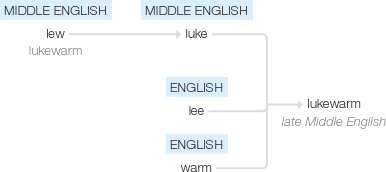Lukewarm
late Middle English: from dialect luke (probably from dialect lew ‘lukewarm’ and related to lee) + warm.
wiktionary
From Middle English leukwarm, lukewarm(“lukewarm, tepid”), equivalent to luke(“lukewarm”) + warm. Compare Saterland Frisian luukwoarm(“lukewarm”), German Low German luukwarm(“lukewarm”), German lauwarm(“lukewarm”). First element believed to be an alteration of Middle English lew(“tepid”) (> English dialectal lew), from Old English hlēow(“warm, sunny”), from Proto-Germanic *hliwjaz, *hlēwaz, *hlūmaz, *hleumaz(“warm”), from Proto-Indo-European *ḱal(w)e-, *ḱel(w)e-, *k(')lēw-(“warm, hot”). Cognate with Dutch lauw(“tepid”), German lau(“lukewarm”), Faroese lýggjur(“warm”), Swedish ljum(“lukewarm”), ljummen(“lukewarm”) and ly(“warm”), Danish lummer(“muggy”), Danish and Norwegian lunken(“tepid”), dialectal Swedish ljummen(“lukewarm”).
etymonline
lukewarm (adj.)
"neither cold nor hot, tepid," late 14c., from warm (adj.) + luke (adj.) "tepid" (c. 1200), a word of unknown origin.
Figurative sense of "lacking in zeal, not ardent" (of persons or their actions) is from 1520s. Related: Lukewarmly; lukewarmness. Luke-warmth (1590s) is marked "rare" in OED.
